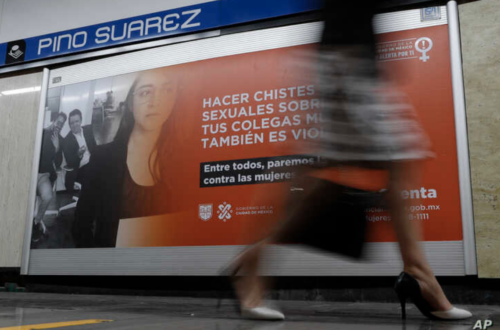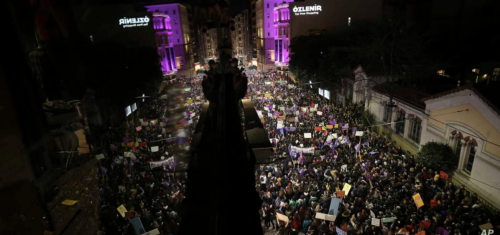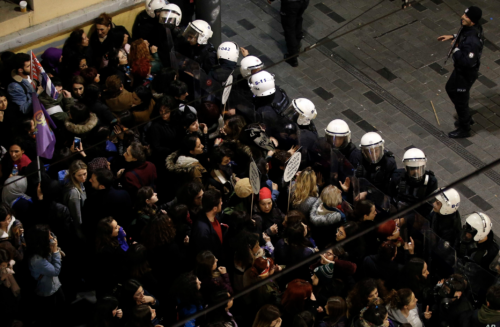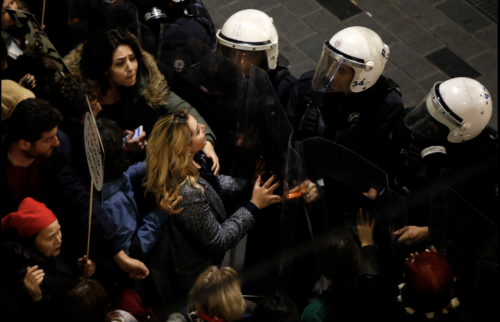
Protesters hold placards as they take cover at a shop after Turkish police fired tear gas on Istiklal, the main shopping street, in Istanbul, during International Women’s Day, March 8, 2019.
Please join our Collective Meditation, with the Mother and Archangel Michael where we say “Enough” to gender violence.
Collective Meditation: 8 Minutes @ 8 AM and/or PM – Holding Love and Sending Love
Mexican Women to March
Against Gender Violence
By Associated Press, March 07, 2020
https://www.voanews.com/americas/mexican-women-march-against-gender-violence

Commuters ride in a subway car in the section dedicated to women and children under 12, in Mexico City, March 5, 2020. After a year of numerous protests against gender violence in Mexico, women are calling for a general strike on March 9.
MEXICO CITY – Protests against gender violence in Mexico have intensified in recent years amid an increase in killings of women and girls.
The killings are often accompanied by sexual assault and sometimes grisly mutilations.
Women are expected to express their outrage in a march in Mexico City on Sunday, International Women’s Day. Smaller demonstrations will be held across the country.
Women and girls also plan to hold protests on Monday.
Mexican women are being urged to skip school, shun housework and stay home from work to show the country what it’s like to go one day without them.
Why are they marching?
Government statistics show that more than 10 females are slain on average every day in Mexico, making it one of the most dangerous countries in the world for girls and women. As recently as 2017, an average of seven women were killed each day in Mexico.
“The context of violence against women and against girls in Mexico is especially grave,” said Nira Cardenas, coordinator of the gender unit at the Office of the U.N. High Commissioner for Human Rights in Mexico.
In addition to half the population being at high risk of violence, impunity is a major problem. Few reported crimes in Mexico result in convictions.
Participation in the annual march on Sunday is expected to be higher than during previous marches as a broader swath of society joins the families of the killed and missing who frequently take to the streets, accompanied by feminists and activists.

A woman walks past a sign with a message in Spanish: “Making sexual jokes about your female colleagues is also violence; together we can stop violence against women,” inside a subway station in central Mexico City, March 5, 2020.
Who are the victims?
A series of recent, highly publicized killings in Mexico has led to more debate and calls for protests against gender violence.
The ex-wife of an influential technology entrepreneur was shot to death in November after testifying in a child custody case. A young woman was skinned and disemboweled, allegedly by her boyfriend, in February. Days later, a 7-year-old was kidnapped outside her elementary school and sexually abused; the child’s lifeless body was disposed of in a plastic bag found in an empty lot.
The victims shared a history of abuse in their households, and failings by Mexican authorities.
A contingent of mothers of victims will march together Sunday in a show of sorority and tears.
“We want to give a hug not just to those who are no longer physically here with us, but also to each and all of those women who will soon become part of our family [of victims],” said Araceli Osorio, mother of Lesvy Berlin, who was strangled to death by a boyfriend on the campus of Latin America’s largest university in 2017.
What is Mexico doing about the problem?
Mexico has aggressive legislation for punishing violent crimes against women. The deficit comes in the application of the law.
“Mexico is the country of rights on paper,” said Ana Pecova, director of advocacy group EQUIS Justice for Women.
Since 2011, killings of Mexican women that carry signs of hatred for the gender, such as mutilation, have come with a stiffer minimum sentence than regular homicides.
Congress increased the femicide sentence again in February, to 65 years, and passed a constitutional amendment last year that allows for preventive detention for those accused of domestic violence for a second time. The majority of women killed in Mexico are targeted by their own partners.
Authorities often lack the tools, motivation and capability to investigate crimes, leading family members of victims to pursue the cases themselves. Several mothers complain that their missing girls were initially dismissed as runaways and their killings wrongly ruled suicides.
Some protests become rowdy. Why?
A women’s protest in February became rowdy, following a pattern of street outrage in the past. A masked protester tried to set fire to a wooden door of the presidential palace while others drenched it with red paint.
Destruction of public property has become a mainstay of feminist protests in Mexico City since a small group trashed a bus station, police precinct and a major monument in August in disgust over the city’s bungling of an alleged rape by police of a teenager.
The vandalism drew heavy criticism. The vandals argue that women are more important than statues or broken windows, which can be repaired. A woman whose life is cut short by violence never returns, they say.
“We ask ourselves all the time: What else can we do?” said Cardenas.
What’s next?
The grassroots movement for a nationwide strike by women on Monday was inspired in part by similar actions in countries such as Argentina and Chile.
“We have to say: Enough already,” said Maria de la Luz Estrada, coordinator of the National Citizens Observatory of Femicide. “We’re calling for the rule of law to work. They have to guarantee the integrity of the lives of every male and female.”
Major banks, media companies and law firms have joined the call for women to become “invisible” for a day. The Coparmex business group encouraged its more than 36,000 members across the country to take part, estimating the one-day work stoppage would cost the economy hundreds of thousands of dollars.
The Education Ministry issued a last-minute endorsement of the initiative, cognizant that schools depend heavily on female personnel.
Participants hope the national dialogue will spur change. Households where men share the chores, they note, have lower incidences of domestic abuse. Prevention is key, but so are consequences. Authorities need more funding to investigate cases, and instruction on how to do so in a timely and empathetic manner.
Women’s Day Spurs
Femicide Protests Across Turkey

Protesters gather at Istiklal street, the main shopping street in Istanbul, during International Women’s Day, March 8, 2019. The day has been sponsored by the United Nations since 1975 as millions around the world are demanding equality.
By Dorian Jones, VOA, March 08, 2019
https://www.voanews.com/europe/womens-day-spurs-femicide-protests-across-turkey
ISTANBUL – In Turkey, International Women’s Day saw nationwide protests, with many focusing on the growing scourge of violence against women. According to rights groups, hundreds of women are slain yearly in Turkey.
In Istanbul’s Kadikoy district, the heart of the Asian side of the city, hundreds of women gathered, holding placards condemning violence against women.
“We are here to demand the police and judiciary take these endless murders of women seriously. I have had enough of these killings,” said Sibel, who wanted to give only her first name.
Police presence
Despite a heavy police presence, the Kadikoy demonstration passed without incident. But thousands of women gathered in Istanbul’s main Istiklal Street area, where hundreds of riot police, backed by armored cars, used rubber bullets and tear gas to break up a procession.
In Izmir, on Turkey’s western Aegean coast, police using clubs broke up a Women’s Day demonstration, arresting seven. However, most commemorations and protests, held in many towns and cities across Turkey, ended without incident.

Turkish police block protesters wanting to hold a march for the International Women’s Day, in Istanbul, March 8, 2019.
The scale and extent of the protests, in the face of strict laws controlling demonstrations, reflect a growing assertiveness regarding women’s rights and violence against women. Last month saw nationwide outrage through social media and protests over the death of Sule Cet, 23.
Police initially treated Cet’s death as a suicide after she fell from the 20th floor of an office building, where she worked overnight. After intense pressure from an attorney representing Cet’s family, police finally treated her case as a homicide, with her boss and another man now standing trial for rape and murder.
Anger about the case was exacerbated when the defense attorney said Cet was not a virgin and that she should not have been drinking with her boss late at night. The case, which has engrossed millions, has become a focal point for women’s rights groups across Turkey and the source of growing anger about an increasing number of killings. Cet’s name has become a leading hashtag, while talk shows and social media have become platforms for people’s outrage about the way the case has been handled.

A protester reacts as Turkish police block Istiklal, the main shopping street, in Istanbul, during International Women’s Day, March 8, 2019.
“Cet’s case raises so many issues that are wrong about the way cases of murdered women are handled,” said law professor Istar Gozaydin, who is also a presenter of a women’s rights television program.
“In the judicial process, we see the private lives of the victims being routinely mentioned or the character of the victim being impugned, like raising whether the victim is a virgin or not. Also, the figures of murdered women given by authorities are not very reliable. They are designated as accidents or considered as suicides, which we saw in Sule Cet’s case,” added Gozaydin, who is doing research on violence against women for the European Union.
This week, the Umut, a prominent nongovernmental organization, said that 477 women were slain and 232 were injured by men in 2018, and that Turkish media reported 1,760 femicide cases over the past four years.

Protesters hold placards as they take cover at a shop after Turkish police fired tear gas on Istiklal, the main shopping street, in Istanbul, during International Women’s Day, March 8, 2019.
In 2012, Turkey’s AK political party made the country the first signatory of the Council of Europe’s convention to protect women. The document is intended to prevent violence against women, provide victim protection and “end the impunity of perpetrators.”
“On paper, the legal regulations and structures are very sufficient [in Turkey] to stop violence and murders against women,” said Gozaydin. “But the way the judiciary and police enforce these procedures and laws is very, very problematic. That’s why the judicial process should be monitored very closely to achieve a fair trial.”
Seen as major problem
Experts suggest there is a growing awareness within Turkish society about the scale of violence against women. A survey released this month by Istanbul’s Kadir Has University found that 60 percent of the participants viewed violence as “the biggest problem that women face in society.”
The issue appears to be crossing the deep political divide between religious and secular Turkey. “It [violence against women] has become the target issue of so many people to give their reaction,” said Gozaydin. “It is just not limited to the secular group or just women. It is much wider.”

